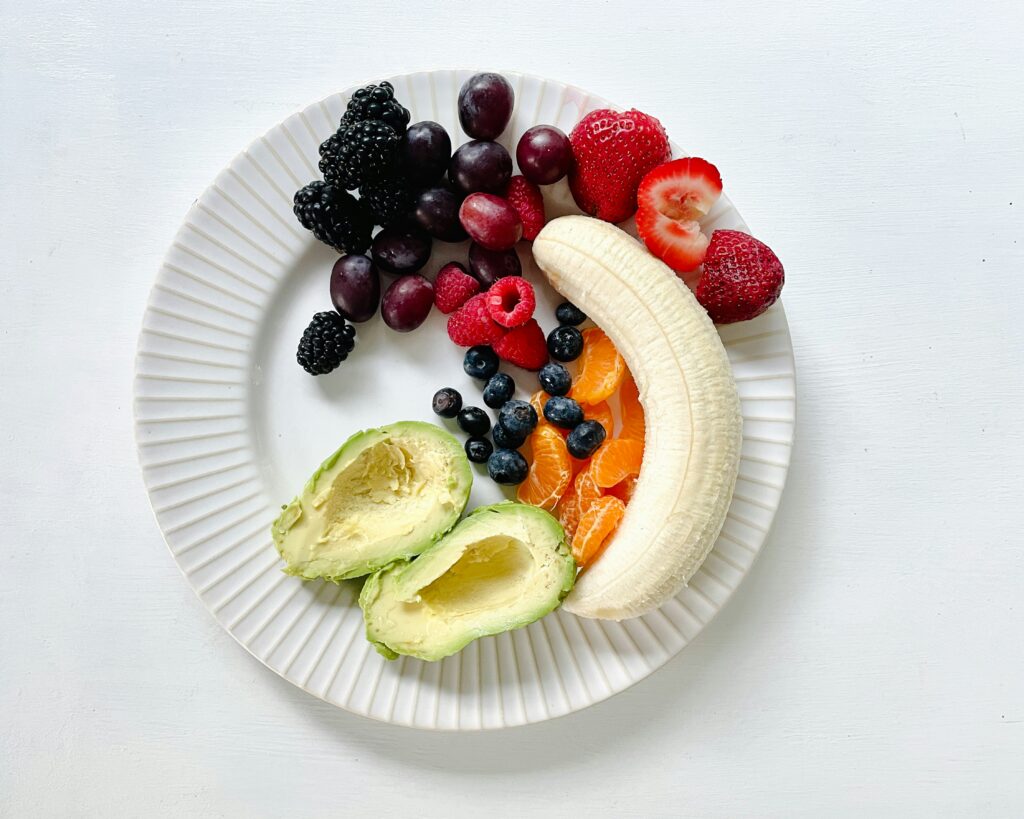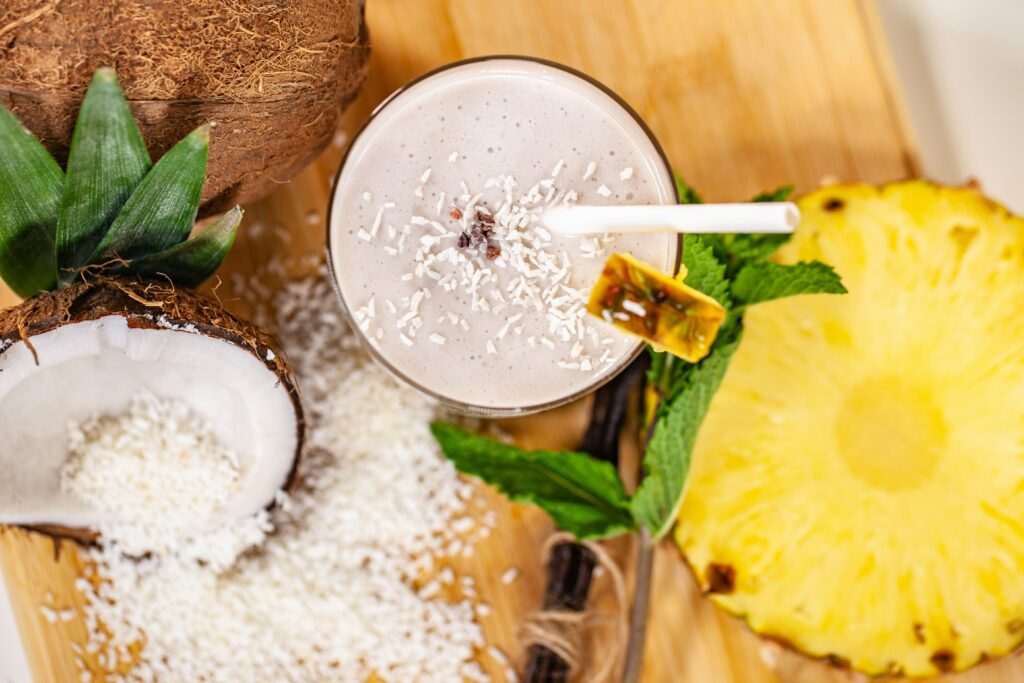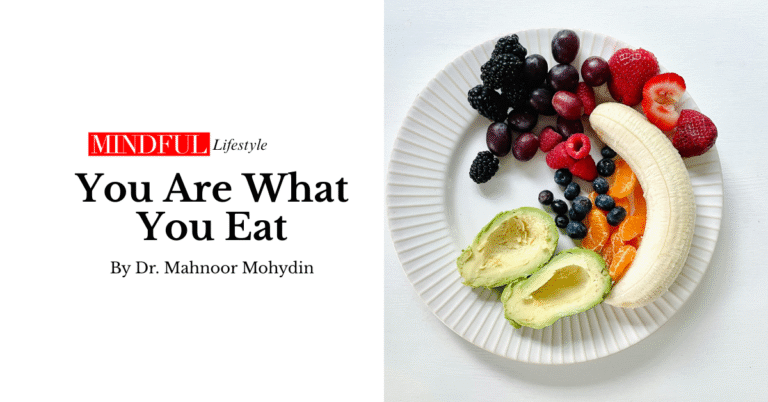By Dr. Mahnoor Mohydin
Food is the fuel for our body. Its primary purpose is to provide the necessary nutritional value and supply the precursors needed to generate energy. Therefore, eating for overall health is crucial—not only for physical appearance, but also for maintaining hormonal balance and mental health. However, both overindulgence and malnutrition can be harmful to our wellbeing.
Our bodies have distinct needs at every stage of life. From infants to toddlers, young children to young adults, and from thriving adults to the elderly, each age group requires different nutrients. It’s crucial to understand that we must provide our bodies with what they need. Just as an infant shouldn’t be given solid foods before six months, we can’t sustain an adult on just a milk diet. Recognizing what our bodies require—and what they don’t—benefits us in the long run. It’s a form of self-respect and reflects mindfulness in how we care for ourselves.
Often, we set out to improve our meal plans, hoping to build a healthier relationship with food. We desire the pleasure of flavors without letting our “food-ship” become toxic. But maintaining this balance isn’t always easy; it requires regular motivation and reflection. While many of us focus on adjusting our diets to meet weight goals, there’s more to nourishing our bodies than just what the scale says. True well-being comes from a deeper understanding of what we need and how food fuels us beyond appearances.

Portion control and strict diet plans can often leave us feeling overwhelmed or unsatisfied. It’s important to remind ourselves that food not only shapes our bodies but also serves to fulfill our functional needs. It is the energy source that sustains us. The saying, “You are what you eat,” is rooted in wisdom, highlighting the importance of being mindful of what we consume.
In our culture, we are taught to eat foods that are “halal and tayyab,” meaning pure and wholesome. This practice extends beyond just the act of eating—it encompasses the preparation and acquisition of food as well. Take, for example, the ritual of preparing meat from a sacrificial animal. The intention behind it is to nourish the body of the person consuming it, allowing them to perform good deeds. In this way, the animal becomes a source of wellness for a righteous individual. Similarly, it’s not only about acquiring food through the proper methods but also ensuring it is ethically sourced. This involves both hygienic practices and rightful earnings, which safeguard the moral integrity of both the individual and the community.
Food, thus, is not just sustenance—it’s a celebratory need, essential for thriving and the building blocks of life. It’s a source of nourishment, not only for the body but for the spirit, and shapes our well-being in a holistic manner.
To assist in cultivating a mindful approach to eating, we aim to offer simple, practical tips that can easily be incorporated into your daily lifestyle. However, if you have any specific health conditions or concerns, please consult with your physician or nutritionist.
Before beginning to Eat:
Before we eat, we are encouraged to recite the words of Allah. Our spiritual teachers often share stories illustrating how this practice brings mindful awareness of the ‘Giver of Rizq’ (Provision). By starting with gratitude, we not only express thanks for the food but also reaffirm our praise for the Provider who has set this meal before us. This simple acknowledgment before eating helps cultivate a sense of mindfulness, giving us control over our actions. As a result, we are more likely to eat wisely, maintaining balance and awareness in our eating habits.
Avoid / Cut:
Before getting to know someone, modern psychology recommends that we first spot the ‘Deal Breakers’. Rather than focusing on what we like, it’s important to first identify the danger zones. This helps us protect our time and investment. The same principle applies to what we consume. We should first acknowledge what we should avoid and cut them out completely. If we keep indulging in them, they can (and will) disrupt the normal physiological balance of the body, slowing down metabolic processes. Over time, this leads to irreplaceable damage and chronic dysfunction.
- Smoking (All kinds: cigars, shisha, hookah, cigarettes, etc.)
This should come as a ‘no-brainer’ by now. A lot of awareness has been raised about the dangers of smoking, yet it continues to be a pervasive health menace. It’s crucial to recognize that the package of every tobacco product clearly states the hazards, making it akin to purchasing your own poison.
- Vaping
This recent menace is quite concerning. Many people, particularly non-smokers, have started vaping under the mistaken belief that it’s a safer alternative. Initially marketed as a tool to help smokers quit, vaping is now being used by many who otherwise would have never smoked. This misleading advertising has created a new generation of smokers and is a growing health concern.
- Passive Smoking
Inhaling secondhand smoke is just as dangerous and may even be worse than active smoking. You might not be the one holding the cigarette, but exposure to multiple smokers increases the risk significantly. The cumulative effect of inhaling smoke from others can have devastating health consequences.
- Alcohol & Beer
No form of alcohol is beneficial to your health. There is a popular myth that alcohol is good for your heart, but recent studies, including one from the University of Toronto, have debunked this. Cutting alcohol from your life is actually the best approach for overall health. It poses significant risks to your brain, liver, and kidneys—organs essential to your vitality. These organs work together to maintain your systemic network, and alcohol impairs their function.
On a lighter note, if you enjoy alcohol to stay warm in the cold, there are healthier alternatives—invest in quality heating or warm clothing instead!
What to eat or not to eat, that is the question?
Here are some recommendations: (Note: not all)
Breakfast:
Despite being the most important meal of the day, many people commonly skip breakfast. After hours of sleep, your body has been in a fasting state, so it’s important to nourish it with food. While many opt for a cup of coffee or tea to start the day, studies show that consuming these beverages on an empty stomach regularly can lead to gastrointestinal issues. Even if you don’t want a heavy breakfast, it’s important to eat something before reaching for that caffeine.
Focus on keeping your breakfast savory to avoid sudden glucose spikes:
– 2 boiled egg whites or
– 1 whole boiled egg (If you enjoy the yolk, one whole egg is fine, but if your goal is to lower cholesterol, it’s better to avoid the yolk. It does contain healthy fats, but moderation is key).
Tip for Boiling Eggs: Add a pinch of salt to the boiling water. This accelerates cooking time and makes it easier to peel the egg.
– Barley or oats porridge:
– Add 1 to 1.5 tablespoons of barley or oats to one small glass of milk or half a glass.
– Use preservative-free milk or opt for 2% fat milk.
– First, cook the grains in half a cup of water, and once softened, add half a cup of milk. This method ensures you don’t waste extra milk.
– Cook without added sugar. The lactose from the milk provides natural sweetness. If you prefer it sweeter, add a teaspoon of brown sugar or honey (avoid adding more than one teaspoon).
– One mug of green tea (e.g., Tapal lemon or Moroccan mint), matcha, or black coffee (half a spoon of matcha or coffee in a small cup, add boiling water only). If you need sweetness, try adding honey instead of sugar.
Supplements:
– With your breakfast or before bed, take tablets containing Omega-3 (from Cod Liver Oil).
Occasional Options:
– Fried eggs or omelets (cooked in no more than 1 tablespoon of oil)
– Pancakes or waffles (moderately, when desired)

Lunch / Dinner Options:
– Vegetables (before every main meal):
A plate or bowl of vegetables before your main meal is highly recommended. This can be a salad (ensure the dressing is minimal and not overly salty) or any one vegetable of choice. Some options include:
– Avocado, tomato, onion, asparagus, peas, dark leafy greens (spinach, lettuce, kale, Swiss chard).
– Other options: Cucumbers, broccoli, olives, carrots, etc.
– Yogurt:
Yogurt is an excellent source of protein and calcium. It’s a great alternative if you want to switch from your regular protein shakes, even post-workout.
– Legumes (e.g., Daals):
Eating at least one serving (around 130g) of legumes per day ensures you’re getting your protein intake in check. Examples include beans (pinto, red, white, or soybeans), alfalfa, clover, lupins, green beans, peas, peanuts, dry beans, broad beans, chickpeas, and lentils.
– Lean cuts of meat:
Opt for lean cuts of meat like beef, lamb, chicken, or turkey breast.
– Poultry (skin removed):
Always remove the skin from poultry to make it healthier.
– Fish:
Fish is a great source of healthy fats and protein. Recommended options include tuna and salmon.
When to Have Dessert?
Desserts can occasionally be enjoyed, but it’s best to have them post-meal and in controlled portion sizes (refer to the general guidelines for proper consumption). The reasoning behind this is that consuming desserts after a meal helps to control glucose spikes—though not completely, it is better than consuming them on an empty stomach. This practice aligns with the traditional way of serving dessert after the main course, with wisdom rooted in health benefits.
Between Borders:
– White Rice: Limit the intake of white rice, or ideally, avoid it. Opt for brown rice for more nutrients and fiber.
– Roti: It’s important to include fiber in your diet, so don’t completely remove roti from your meals. Avoid roti made from white flour (maida); instead, choose whole wheat flour roti for better health benefits.
– Bread: Limit or avoid both white and brown bread. Choose whole grain bread instead, as it contains the most fiber and is the healthiest option.
Nature’s Candy (From the Sunnah):
– Honey: A tablespoon of honey can be added to toast or any drink. Known for its various immune benefits, honey also aids in improving metabolism.
– Dates (Ajwa): Eating one to three Ajwa dates a day is beneficial, especially for weight management. It is recommended to balance their intake with other foods consumed during the day. One Ajwa date contains about 40 calories. Seven Ajwa dates are considered a full meal. Dates with almond filling are also a great option, but be mindful of portion sizes.
Fruit:
- Choose raw fruit over juices. Juices often contain more fruit than we realize— for example, it takes 6 oranges to make a tall glass of juice, leading to unintended excess consumption. This is particularly important if you are managing weight. Juices, however, can be beneficial when recovering from an illness or when in a catabolic state, depending on your body’s needs.
– Apples (the most advised) – as the saying goes, “an apple a day keeps the doctor away.”
– Blackberries, blueberries, and citrus fruits are also highly recommended.
– Other fruits can be enjoyed, but be mindful of portion sizes.
– Ideally, consume seasonal fruits that are fresh and locally available.
Snacks:
– Green tea (2 to 3 cups daily) is known for its antioxidant properties and its ability to help lower cholesterol. However, if you have any concerns about oral health, such as staining from tea, consult with your dentist.
– Regular English tea (with minimal milk and sugar).
– Channa chat is a nutritious snack option.
– Nuts like almonds and walnuts.
– Dates (Ajwa or with almond filling) can be an occasional snack.
General Rules:
– Limit sugar intake to 36 grams per day for males and 26 grams per day for females. This is the upper limit—ideally, aim for less.
– Example: One glass of orange juice contains 21 grams of sugar. Choose wisely when it comes to sugar sources in your diet.
– The ideal intake of oil/butter should not exceed 2 tablespoons per day (this includes cooking oil).
– Tip: Avoid overcooking oils and butter, as this can create unhealthy fats. Opt for an oil spray to coat the pan, ensuring only the essential amount is used.
Limit:
– Commercial baked goods such as cookies, doughnuts, and pastries.
– Processed meats like hot dogs, sausages, and pepperoni.
– Fatty cuts of meat, including ribs, poultry with skin, and heavily marbled meats.
– Full-fat dairy products such as butter, cream, and cream cheese.
– Coconut oil and palm oil should be limited.
– Fried foods.
– Canned foods, especially for individuals over 50, due to the preservative and salt content.
Bon Appetit!
It’s crucial to recognize that our mental state is directly tied to our physical health. Harmony between the body and mind is essential for overall well-being. Practicing mindfulness helps open doors to conscious thriving, and that journey begins with the intention of making the right choices, starting with “Bismillah.”
Dr. Mahnoor Mohydin is an M.B.B.S doctor with an interest in holistic approaches in the practice of medicine, with a passion for research.



